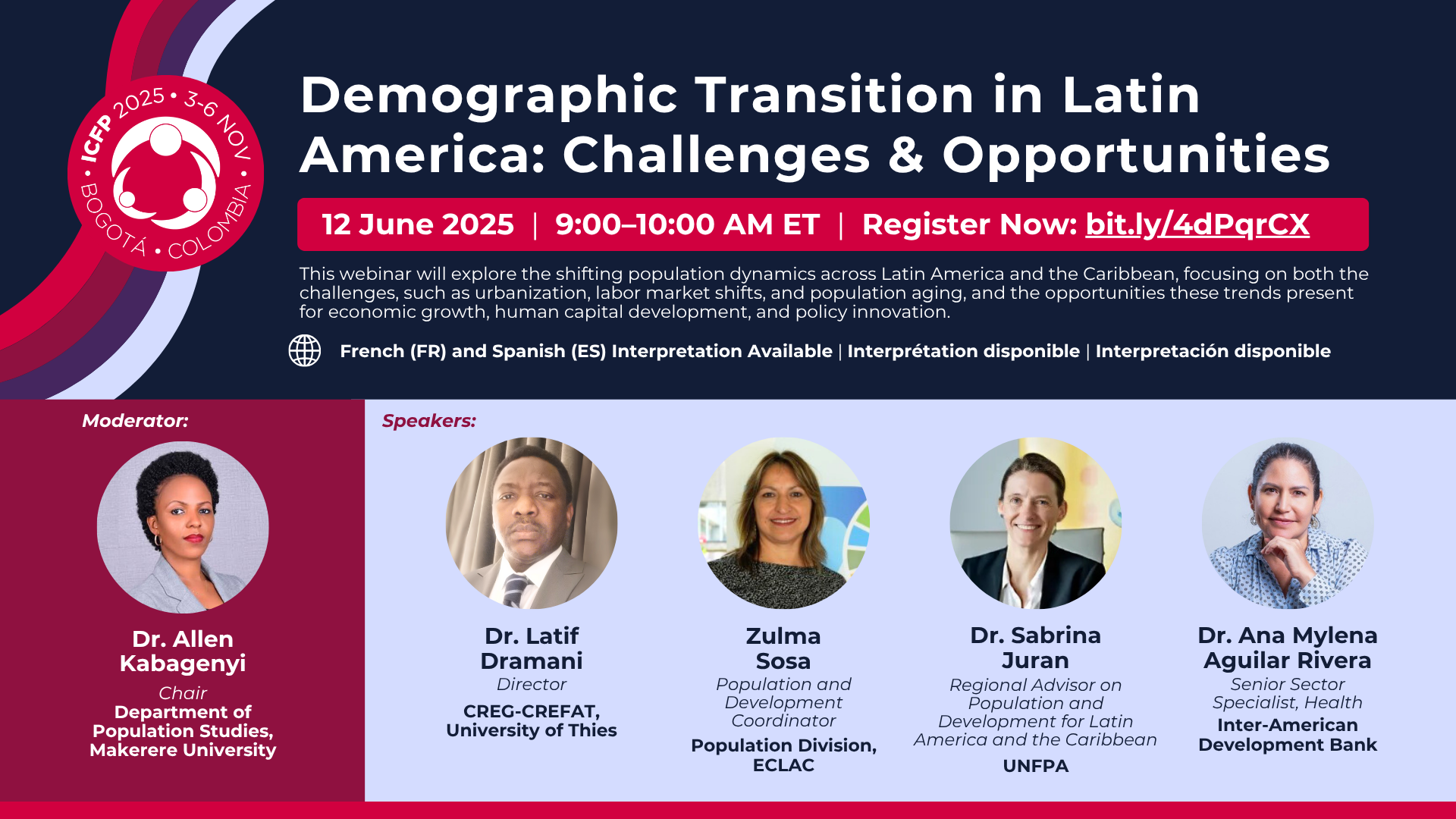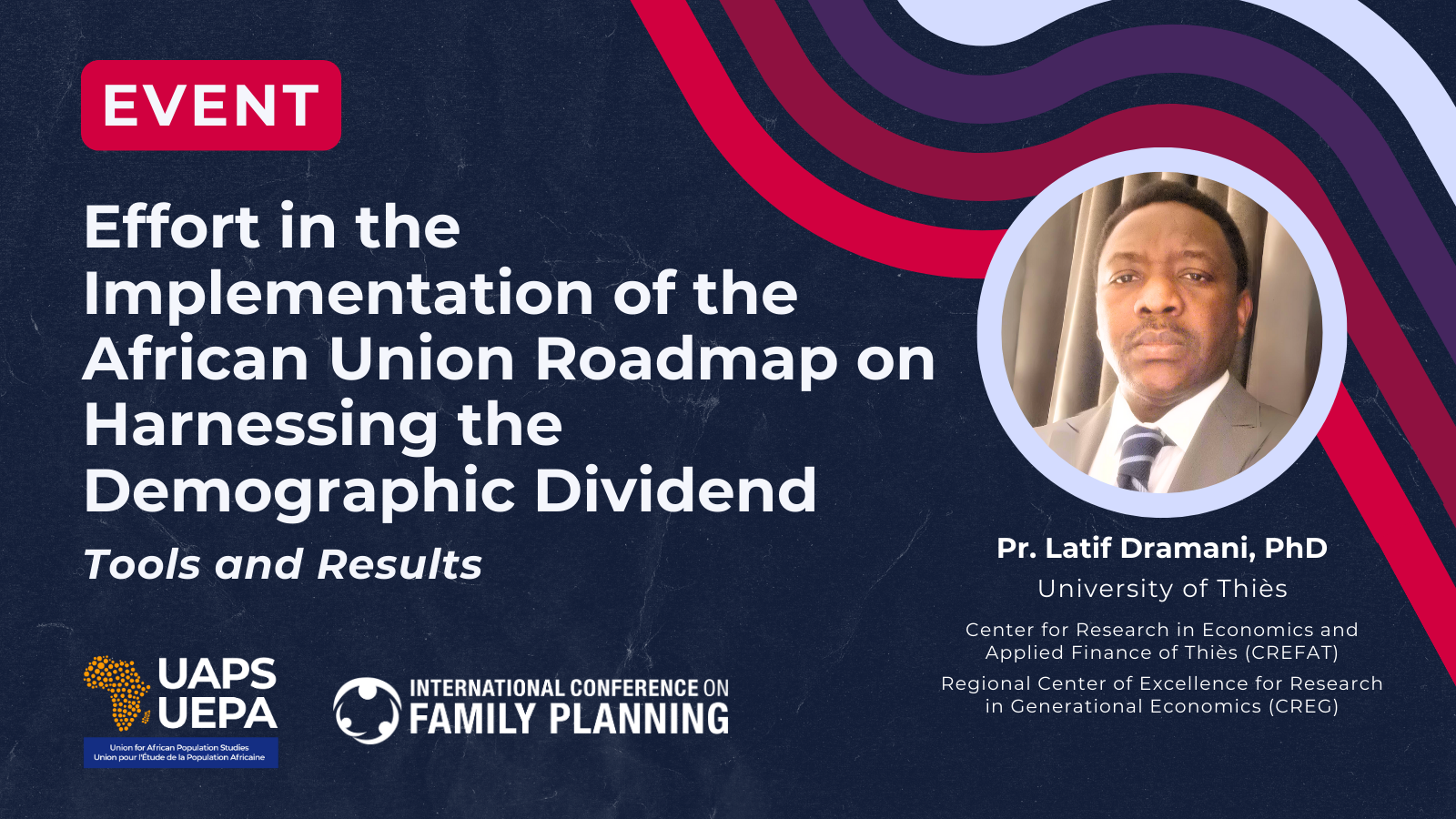ICFP Demographic Dividend Subcommittee
FAQ
What Do You Do?
The Demographic Dividend (DD) Subcommittee equips ICFP participants with the information and skills needed to effectively move policy and advocacy efforts around the DD agenda forward.
Additionally, the subcommittee identifies existing gaps in important and emerging DD interventions and ensures they are highlighted throughout the conference, in collaboration with the Scientific Subcommittee.
Who is Involved?
The DD Subcommittee continues to expand its members, partners, and supporters. Current collaborators includ the William H. Gates Sr. Institute, Population Reference Bureau, and Makerere University.
Contact
About This Subcommittee
The Demographic Dividend Offers a Framework for Accelerated Economic Growth
The Demographic Dividend (DD) is the boost in economic growth that can result from changes in a country’s population age structure. As fertility rates decrease, a country’s working-age population grows larger relative to the young dependent population. With more people in the labor force and fewer children to support, a country has a window of opportunity for rapid economic growth if the right social and economic investments and policies are made in health, education, governance, and the economy.
The Demographic Dividend Subcommittee equips ICFP participants with the information and skills needed to effectively move policy and advocacy efforts around the DD agenda forward.
The subcommittee’s efforts highlight the imperative role of investments in, and commitments to, family planning to promote demographic transition and, ultimately, the potential economic benefits of a DD.
The subcommittee’s mission is to guide policymakers across multiple sectors as they develop strategies to achieve the DD and increase local commitment to harnessing the DD through support to advocates, programmers, and researchers.
The DD Subcommittee’s vision is that investments that empower women and couples to have the number of children they desire through voluntary family planning are universally viewed as foundational to social and economic development.
Sponsors
Thank you to the sponsors of the ICFP 2025 Demographic Dividend Subcommittee Pre-conference for supporting this important work.
DD Subcommittee
The Demographic Dividend (DD) Subcommittee brought together policymakers, researchers, and practitioners from three regions at different stages of demographic transition—Latin America and the Caribbean (later-stage), South Asia (intermediate), and sub-Saharan Africa (earlier-stage)—to foster shared strategies and identify context-specific pathways to maximize the economic and social returns of demographic change.
The subcommittee’s pre-conference made clear a foundational truth: the demographic dividend is not automatic. Changing age structures only generate gains when countries deliberately invest in gender equality, SRHR, education, and labor market opportunities.
Major Events, Activities, and Impact
DD Pre-Conference
2 November 2025
Supported by the William H. Gates Sr. Institute for Population and Reproductive Health (WHGI), WHO India, UNFPA, and FP2030, the pre-conference was structured around three interconnected themes:
- the gender dividend as a catalyst for women’s empowerment;
- evolving challenges to reproductive rights in an era of growing fertility diversity;
- and the central role of FP and SRHR investments in advancing both gender and demographic dividends.
Panel 1: The Gender Dividend and Women’s Empowerment
Moderated by Jen Kidwell (Gates Foundation), this panel featured experts from the LAC region, India, Nigeria, and Liberia. Key findings included: LAC’s fertility decline from 5.8 to 1.8 children per woman since 1950 is reshaping the region, yet a persistent “care crisis” continues to restrict women’s economic autonomy. In India, delaying first pregnancy by more than two years is associated with an 82% increase in likelihood of employment and an estimated US$1,300 annual household income gain. Research from Liberia showed women contribute 23.9% of GDP and 34.8% of labor supply—with unpaid work valued at US$540 million annually—and that closing gender gaps could increase GDP by up to 12.6%.
Panel 2: Reproductive Rights in an Era of Fertility Diversity
Moderated by Ana Cristina González, this panel challenged the notion of a universal “fertility crisis,” presenting instead a picture of divergent demographic realities: unrealized fertility in low-fertility settings, persistent unmet need in high-fertility contexts, and growing policy pushback against reproductive rights. Panelists from UNFPA, UNICAMP, Population Council, and FP2030 called for rights-based policies that support diverse family forms, resist both anti-rights backlash and instrumental pronatalist agendas, and keep reproductive autonomy at the center.
Panel 3: Investing in FP and SRHR for Gender and Demographic Dividends
Moderated by David Imbago-Jacome (CIFF), this panel addressed the global health austerity crisis head-on. Dr. Dorothy Balaba (PSI) revealed that cuts by major donors—including a 67% reduction from the U.S. and over 30% from European governments—have triggered widespread program closures and commodity shortages across sub-Saharan Africa, where development assistance finances up to 40–60% of total health spending. Brazil’s Vice Minister of Health Ana Luíza Caldas presented Brazil’s robust universal health system as a model for rights-based, domestically financed reproductive health policy.
Roundtable Discussions: Youth, Financing, Fertility Policy, and Feminist Perspectives
Four themed roundtables deepened the panel discussions. The adolescent roundtable, moderated by Youth Trailblazer and ICFP awardee Tahani Zaidi, called for adolescents to be elevated from passive beneficiaries to co-creators of reproductive health policies. The financing roundtable explored innovative models including Ethiopia’s SMART approach, Bolivia’s transition to government-supported family planning, and matched financing mechanisms. The fertility pathways roundtable examined how political rhetoric frequently hijacks demographic discussions. The feminist perspectives roundtable explored how intersectionality determines who benefits from rights-based policies—concluding that “life chance determines life choice” and that structural investments must accompany legal reforms.
Impact
The DD pre-conference produced rare inter-regional dialogue between LAC, South Asia, and sub-Saharan Africa—regions that are rarely in conversation despite being at complementary stages of the demographic transition. By showcasing Colombia’s experience as the host country and facilitating cross-regional exchange, the event generated shared strategies, surfaced common challenges, and identified context-specific pathways. Youth voices—amplified through the adolescent roundtable moderated by Tahani Zaidi—ensured that the demographic conversation remained grounded in lived realities rather than abstract projections. The subcommittee demonstrated that research, advocacy, and program implementation are most powerful when they operate together.
Key Takeaways
The Demographic Dividend Is Not Automatic
Changing age structures only generate gains when countries deliberately invest in gender equality, SRHR, education, and labor market creation. The demographic dividend requires coordinated, multi-sector investment—it will not materialize simply through population change.
There Is No Single Fertility Crisis—Only Fertility Diversity
The world does not face a universal fertility crisis, but a set of divergent realities: unrealized fertility in low-fertility settings and persistently high fertility with unmet need in others. Policy must move beyond demographic panic and center rights—supporting people to have the number of children they want, when they want—while resisting both anti-rights backlash and pronatalist agendas.
The Gender Dividend Is the Gateway to the Demographic Dividend
Women’s reproductive autonomy, labor force participation, and the recognition of paid and unpaid work are preconditions for realizing economic and social returns from demographic change. Advancing gender equality is not only a matter of rights—it is a macroeconomic imperative. What we choose to measure, and how we package it, ultimately shapes policy priorities.
Sustainable Financing Is Now Urgent
The steepest decline in donor funding in 15 years is triggering real, immediate harm—program closures, commodity shortages, and erosion of community-level health infrastructure. Governments cannot abandon populations when funding ends. Sustainable SRHR financing requires domestic resource mobilization, smart public-private partnerships, and political framing that resonates beyond donor cycles.
Life Chance Determines Life Choice
Adolescents and women facing poverty, restrictive norms, and weak systems cannot exercise real autonomy regardless of what policies say on paper. Achieving gender equity requires structural investments that expand opportunities—education, childcare, labor market reform, and SRH services—not only legal reforms that articulate rights.
Powerful Voices
“Advancing gender equality is not only a matter of rights but a macroeconomic imperative with transformative benefits for national development. Liberia’s economy bears a substantial cost from sidelining women’s labor and potential.”
Next Steps:
Calls to Action
For Policymakers:
Integrate gender and care into macroeconomic and demographic planning. Move beyond fertility rates as the primary policy metric to indicators of agency, labor participation, and economic opportunity. Resist pronatalist narratives that instrumentalize women’s bodies and undermine reproductive rights.
For Funders and Governments:
Expand and protect SRHR financing. Develop sustainable domestic financing models—matched financing, local manufacturing, private-sector engagement, and decentralized budgeting—so essential services survive beyond donor cycles. When governments invest in family planning, they create opportunities for the private sector and strengthen primary health care.
For Researchers:
Improve data on agency, unpaid work, and evolving fertility preferences. Move beyond single-point, cross-sectional measures toward longitudinal studies that capture how reproductive decisions change across the life course.
For Programs:
Meaningfully include young people and feminist movements in decision-making. Youth engagement must move beyond tokenism—adolescents should co-define problems, co-design interventions, and assess whether programs meet their needs.
Only through context-specific strategies that combine gender equality, rights-based SRHR financing, better data, and genuine youth and feminist participation can demographic change translate into inclusive, sustainable development.
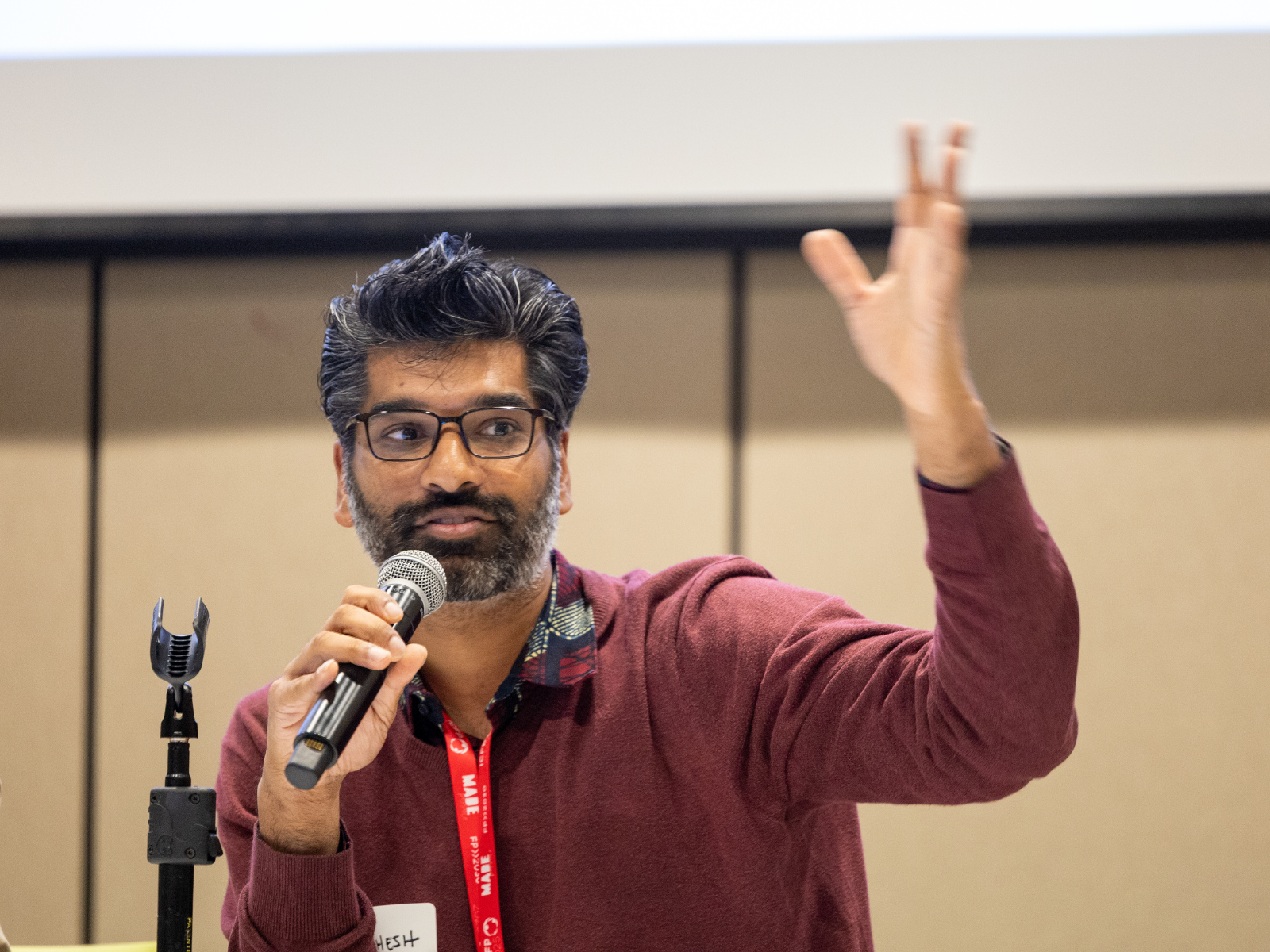



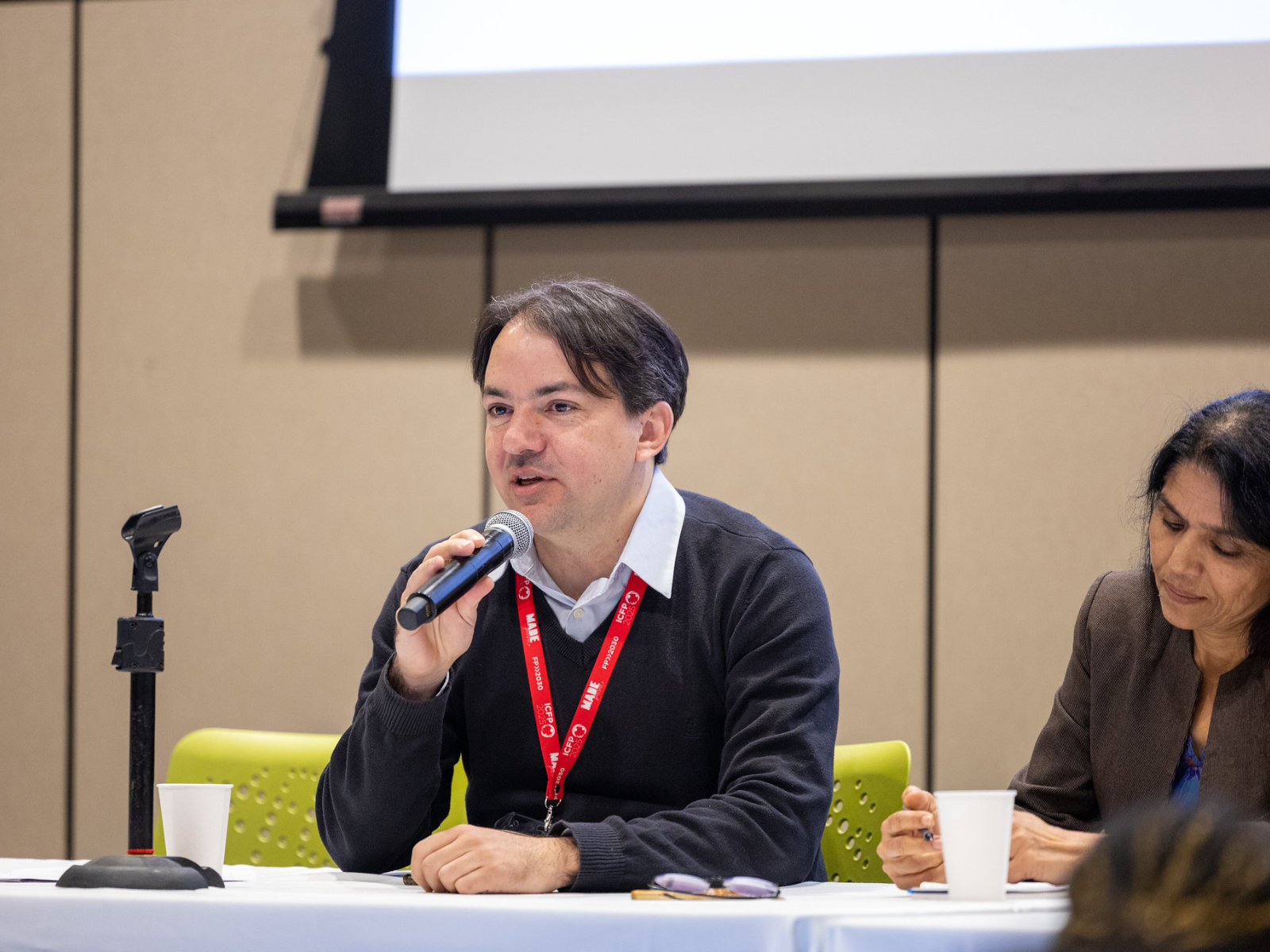




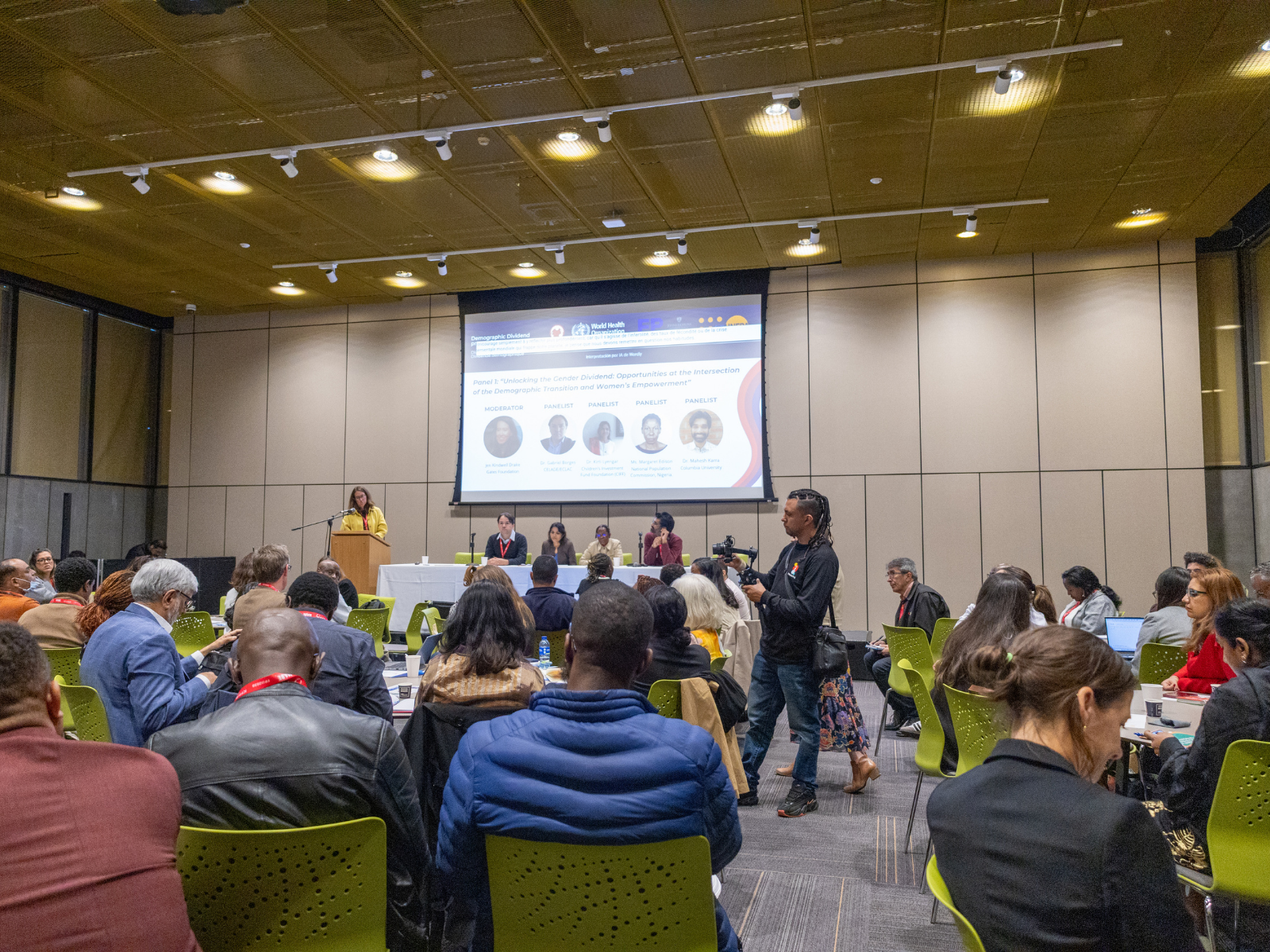

Demographic Dividend:
Event Recordings
View recordings from past webinars, discussions, and in-person events hosted by the ICFP Demographic Dividend Subcommittee below, available in English, French, and Spanish. Explore insightful conversations on harnessing the demographic dividend to advance sexual and reproductive health and rights globally.
Video Highlight
Population Age Structure Changes in Sub-Saharan Africa
This session of the Demographic Dividend Luminaries Series focuses on the possibility of “the youth bulge” (a relatively large increase in the proportion of young people within a population), which can play a significant role in a country’s ability to harness the benefits of a demographic dividend.
Speakers discuss data innovations that the United Nations Population Fund (UNFPA) is leading to support the African region in attaining a demographic dividend. Additionally, participants examine major concerns related to climate change and population in these contexts.
Community Calendar
Stay engaged in the collective effort to advance sexual and reproductive health and rights (SRHR).
The ICFP Community Calendar highlights past and upcoming SRHR events hosted by ICFP subcommittees, partners, and members of the global community—creating opportunities to learn, collaborate, and keep momentum moving year-round.
Explore what’s next and find ways to stay involved.
Meet the ICFP Community
The ICFP platform is anchored by 11 dynamic subcommittees, bringing together individuals and organizations from across the global sexual and reproductive health and rights (SRHR) community.



